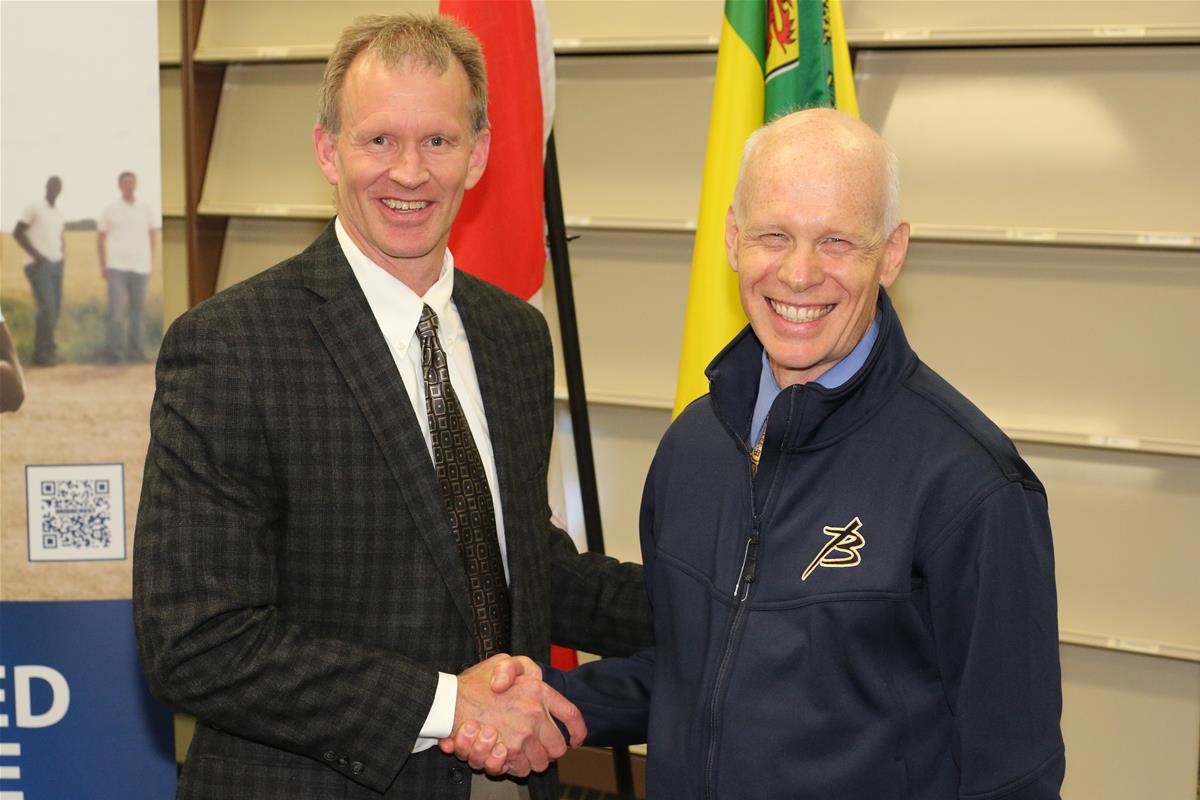Signing of transfer agreement opens new doors for Briercrest and University of Saskatchewan

A milestone has been achieved between the University of Saskatchewan and Briercrest College and Seminary this week with the renewing of a block credit transfer agreement.
“With this agreement we are actually achieving some of the vision for the agreement from 12 years ago, and we are identifying the ways in which we are achieving the visions and we are plotting a course for the next stage,” David Parkinson, vice-dean of humanities and fine arts at the University of Saskatchewan, said.
The transfer agreement, which was signed at the Archibald Library at Briercrest College and Seminary, allows Briercrest students with at least 30 credits to transfer a minimum of 50 per cent of their credits to the College of Arts & Science. This is an extension of the agreement that was signed in 2007.
“We have about 100 courses that students can do at Briercrest that can transfer straight across to the courses of the University of Saskatchewan,” explained Wes Olmstead, VP academic at Briercrest.
“But if you happen to be in a program that doesn’t have as many of those courses, what this agreement does is kick in, that is the block transfer bit, and it says you are guaranteed at least 50 per cent transfer credit, so if you spend a year at Briercrest in a typical program, and you don’t take those courses that are articulated, you’ll be guaranteed at least a semester of credit.”
Michael Pawelke, Briercrest’s president, explained that the signing of the transfer agreement is a step towards better equipping and preparing students for service in the world.
“The University of Saskatchewan is of course our provinces flagship research university. This partnership allows students from across both our province and our country to take advantage of this rich faculty resource and distinctive strengths from both institutions,” Pawelke said.
Parkinson agrees and feels this agreement is about opening up, expanding, and deepening program opportunities for students at both schools.
“Briercrest, from the University of Saskatchewan’s perspective, is and can continue to be, and can become more of, the key partner … as we are going forward to expand and improve the array of undergraduate and graduate education in this province for students around this country and around the world,” he said.
“I am really excited about this signing ceremony as an opportunity to sort of set a seal on the work we have done today … we are really opening the next stage in a very important relationship that I believe should be, and can be, the most important post-secondary academic relationship in this province.”
Parkinson and Olmstead said they are both really encouraged by the signing as they have seen how it has helped student be successful.. They are both looking forward to seeing how it will continue to help students be successful.
“I’ve seen Briercrest students accepted into the University of Saskatchewan programs and thrive,” Parkinson said.
“They really come to the top of their class, demonstrate the very high quality of their academic preparation and take positions of leadership.”
Olmstead said the agreement also symbolizes the nature of the partnership that the two institutions have envisioned. Parkinson agreed.
“Briercrest has unique and special areas of strength which make it really pre-eminent in this part of the country and in very particular ways in Canada as a whole,” said Parkinson.
“So forming the next stage of the relationship with Briercrest is, for the University of Saskatchewan, the obvious right thing to be doing. We are really looking towards substantial next steps in cooperation in delivery of programs. Next steps where we are really looking at each other in important ways as equal partners.”
Parkinson hopes the signing of this new agreement will pave the way for future co-operation between schools.
“I believe this agreement can be the model for all agreements for certainly the college of arts and science with post-secondary institutions in Canada,” he said. “This is not an add-on. This is the way we should be forming partnerships.”
